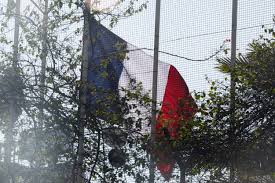In December 2024, France re-established its diplomatic presence in Damascus after a 12-year hiatus, signaling a renewed commitment to engage directly with Syria’s transitional authorities . Subsequently, the French Foreign Ministry appointed Jean-Baptiste Faivre, then Ambassador to Qatar, as Chargé d’affaires for Syria, underscoring the elevation of the Syrian dossier within France’s foreign policy priorities.
Facilitating Kurdish Political Unity
France has actively mediated between the SDF and the KNC to bridge longstanding divisions and promote a unified Kurdish stance in Syria. In April 2025, Paris discreetly sponsored a Kurdish dialogue conference in northeastern Syria, bringing together the SDF, the KNC, and other political parties. The conference culminated in a joint political vision advocating for a “decentralised democratic” state in Syria, emphasizing the inclusion of all ethnic and religious components . France’s engagement with Kurdish groups is partly driven by concerns over Turkey’s expanding influence in Syria, especially in the energy and infrastructure sectors. Drawing lessons from its diminished role in Libya, Paris aims to secure a foothold in the Eastern Mediterranean by supporting Kurdish autonomy and ensuring access to energy transport routes to Europe. Additionally, France’s involvement serves to counterbalance Russian military presence and economic agreements between Damascus and Moscow.
Integration of Kurdish Forces into Syrian State Structures
In March 2025, the Syrian caretaker government and the SDF signed an agreement to integrate Kurdish-led forces into the national military framework. The deal includes provisions for the return of border crossings and oil fields to central government control, as well as the official recognition of Kurdish language rights . France, alongside the United States, played a facilitative role in this agreement, viewing it as a step toward a peaceful political transition that encompasses all components of Syrian society .
France’s strategic bet on the SDF and its proactive diplomacy reflect a broader ambition to reassert influence in Syria and the Eastern Mediterranean. By championing Kurdish political inclusion and advocating for a decentralized Syrian state, Paris seeks to shape the post-Assad order in alignment with its regional interests and values.
This article was translated and edited by The Syrian Observer. The Syrian Observer has not verified the content of this story. Responsibility for the information and views set out in this article lies entirely with the author.


